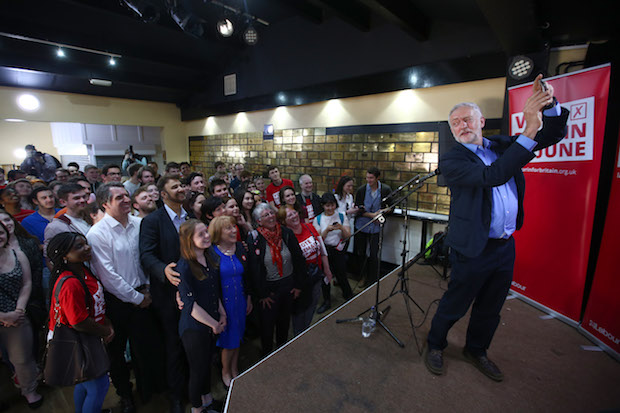As Theresa May sets off hiking in the Italian alps, CCHQ can take heart that – for a change – it’s not Conservative in-fighting dominating the headlines. Instead, it’s Labour’s dubious election promises – thanks to Jeremy Corbyn’s admission on the Andrew Marr show that his party has no plans to abolish pre-existing student debt.
The reason this presents a problem for Labour is an interview Corbyn gave to NME magazine during the General Election campaign. Discussing tuition fees, the Labour leader said that on top of axing fees, he would ‘deal with those already burdened with student debt’:
‘I don’t see why those that had the historical misfortune to be at university during the £9,000 period should be burdened excessively.’
Since making the comments, Corbyn has learnt that wiping out pre-existing student debt is predicted to cost a cool £100bn. It follows that his party is doing its best to play down expectation on the issue. While the Daily Mail describes it as Corbyn’s ‘student debt humiliation’, how bad it is depends on what you think Corbyn meant by ‘deal with it’. It’s fair of Corbyn’s allies to point out that this was not a cast-iron pledge that was in the party manifesto. But even being charitable, it’s safe to say that many former students would expect – at the very least – a serious reduction in what they owed.
So, how damaging is the U-turn? It certainly feeds into the idea that the Labour 2017 pitch was akin to a sweetshop of goodies where the bill for the stock was still outstanding. Even if you take out the £100bn of student debt, the IFS have said they have serious questions over whether Labour could put into action its 2017 manifesto.
It could also harm Corbyn’s ‘authenticity’. Tory MPs hope that by pointing out Corbyn’s change of tune it will help to kill the Corbyn-mania that’s taken hold of the young – and led to the crowds at Glastonbury chanting his name. If they can show that Corbyn is a ‘normal politician’ who goes back on his word, it could neutralise the threat.
But despite the questions it raises on Labour’s grasp of the economy, the Conservatives would be wrong to get carried away. In the 2017 election, the number of young voters (18-24) who favoured Labour rose from 40pc, in 2015, to 60pc. The bulk of these voters didn’t vote for Corbyn because they thought him to be a sound mathematician who would balance the books. Most are also savvy enough to know that if something sounds too good to be true that might be because it is. Despite such reservations, young voters plumped for Corbyn because he represented change. With student debt and little hope of getting on the property ladder, why not take a chance on the party promising to make things better (even if you don’t fully believe they can)? What’s more, even if they decide that Corbyn has misled them over pre-existing debt, that alone isn’t a reason to vote Conservative – a party that has no plans to stop tuition fees in any manner.
It follows that while it’s right to point out Corbyn being shifty on the issue, that alone will not win over voters. If the Conservatives want students to turn up en masse to vote for them, they’ll need to come up with a positive vision of their own and a convincing argument for fiscal discipline.







Comments